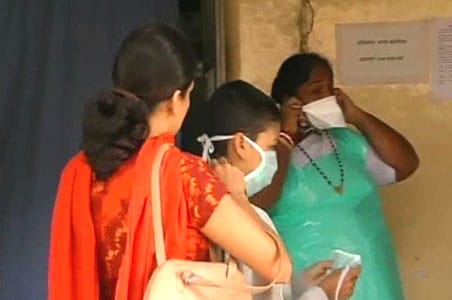
New Delhi:
India's first indigenous vaccine against swine flu is now being tested on animals. Once it proves to be safe, clinical trials on humans will be undertaken and the vaccine is likely to hit the market early next year.
India has never produced flu vaccines in the past because flu is not known to be a big killer here. But after the H1N1 pandemic reached the country, large Indian companies like Serum Institute have stepped in and are now carrying out trials of the vaccine that has been developed in India for the first time.
The vaccine is being tested on animals in sterile rooms at the institute now and once it is cleared phase one human clinical trials will begin.
The World Health Organisation (WHO) had approached Serum Institute to set up a flu facility after the bird flu outbreak in 2006. The one-and-a-half year's work put in on the bird flu vaccine helped fast track the H1N1 vaccine. "We are ready with the vaccine but it has to go through all the tests," says Cyrus Poonawala, MD, Serum Institute.
Serum Institute is using a strain from the WHO-authorised Health Protection Agency in London. But with cooling temperatures bringing fears of a second wave of flu cases, the worry is when the vaccine will be ready.
"By mid October we will start phase one clinical trials on humans. We can't take short cuts in vaccine research. No matter how much we want to hasten the pace, we need to ensure that there it is safe for the population and generates the right immune response," says Dr Rajiv Dhere, head, biological at Serum.
The vaccine, which is being produced at a cost of Rs 100 crore, is likely to hit the market early next year. But given that 60 per cent of the population is likely to get infected by the virus, it will be hard to meet the demand. The government has to prioritise who should get the vaccine, one of the biggest challenges in the control of the pandemic.
India has never produced flu vaccines in the past because flu is not known to be a big killer here. But after the H1N1 pandemic reached the country, large Indian companies like Serum Institute have stepped in and are now carrying out trials of the vaccine that has been developed in India for the first time.
The vaccine is being tested on animals in sterile rooms at the institute now and once it is cleared phase one human clinical trials will begin.
The World Health Organisation (WHO) had approached Serum Institute to set up a flu facility after the bird flu outbreak in 2006. The one-and-a-half year's work put in on the bird flu vaccine helped fast track the H1N1 vaccine. "We are ready with the vaccine but it has to go through all the tests," says Cyrus Poonawala, MD, Serum Institute.
Serum Institute is using a strain from the WHO-authorised Health Protection Agency in London. But with cooling temperatures bringing fears of a second wave of flu cases, the worry is when the vaccine will be ready.
"By mid October we will start phase one clinical trials on humans. We can't take short cuts in vaccine research. No matter how much we want to hasten the pace, we need to ensure that there it is safe for the population and generates the right immune response," says Dr Rajiv Dhere, head, biological at Serum.
The vaccine, which is being produced at a cost of Rs 100 crore, is likely to hit the market early next year. But given that 60 per cent of the population is likely to get infected by the virus, it will be hard to meet the demand. The government has to prioritise who should get the vaccine, one of the biggest challenges in the control of the pandemic.

